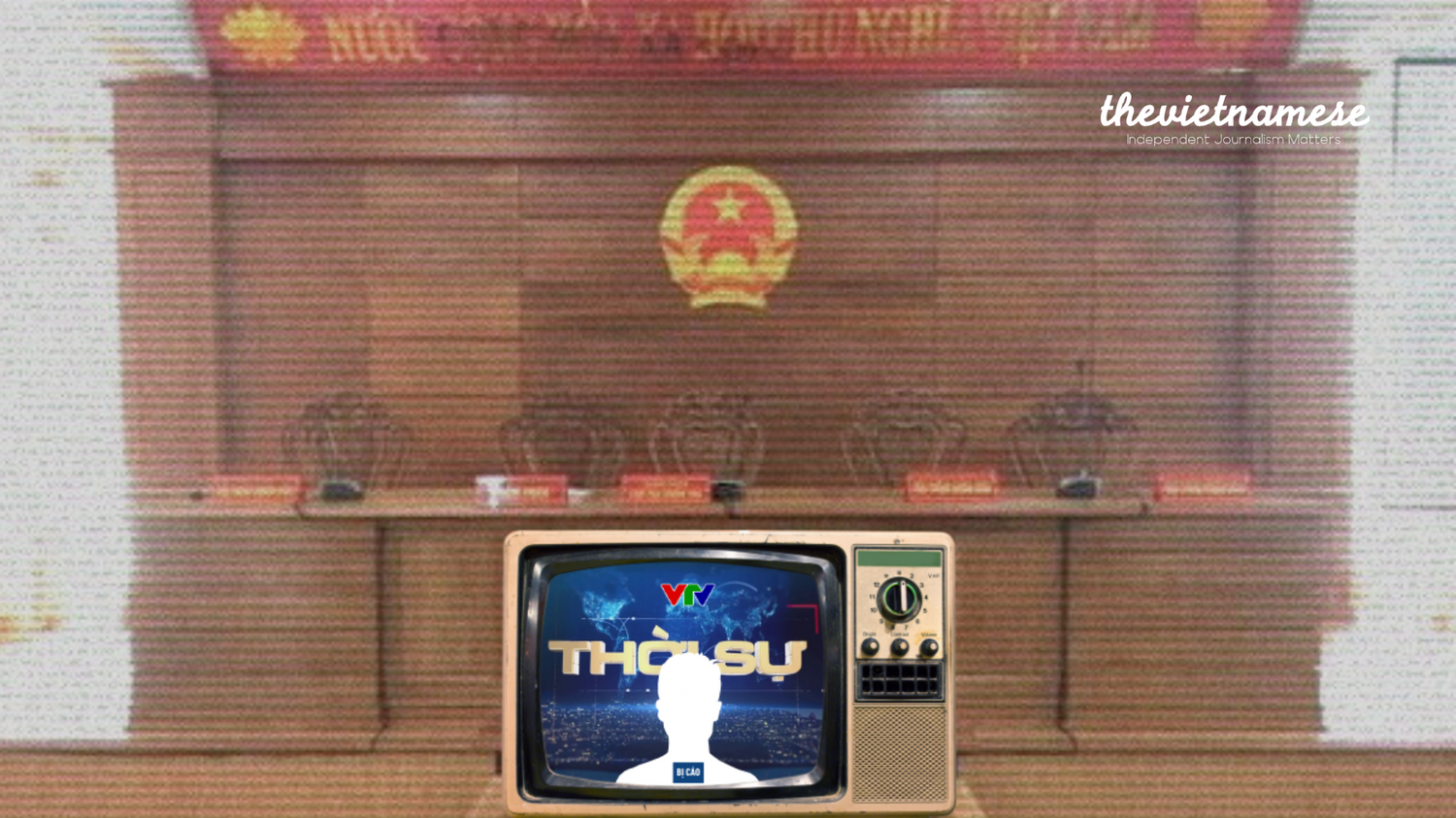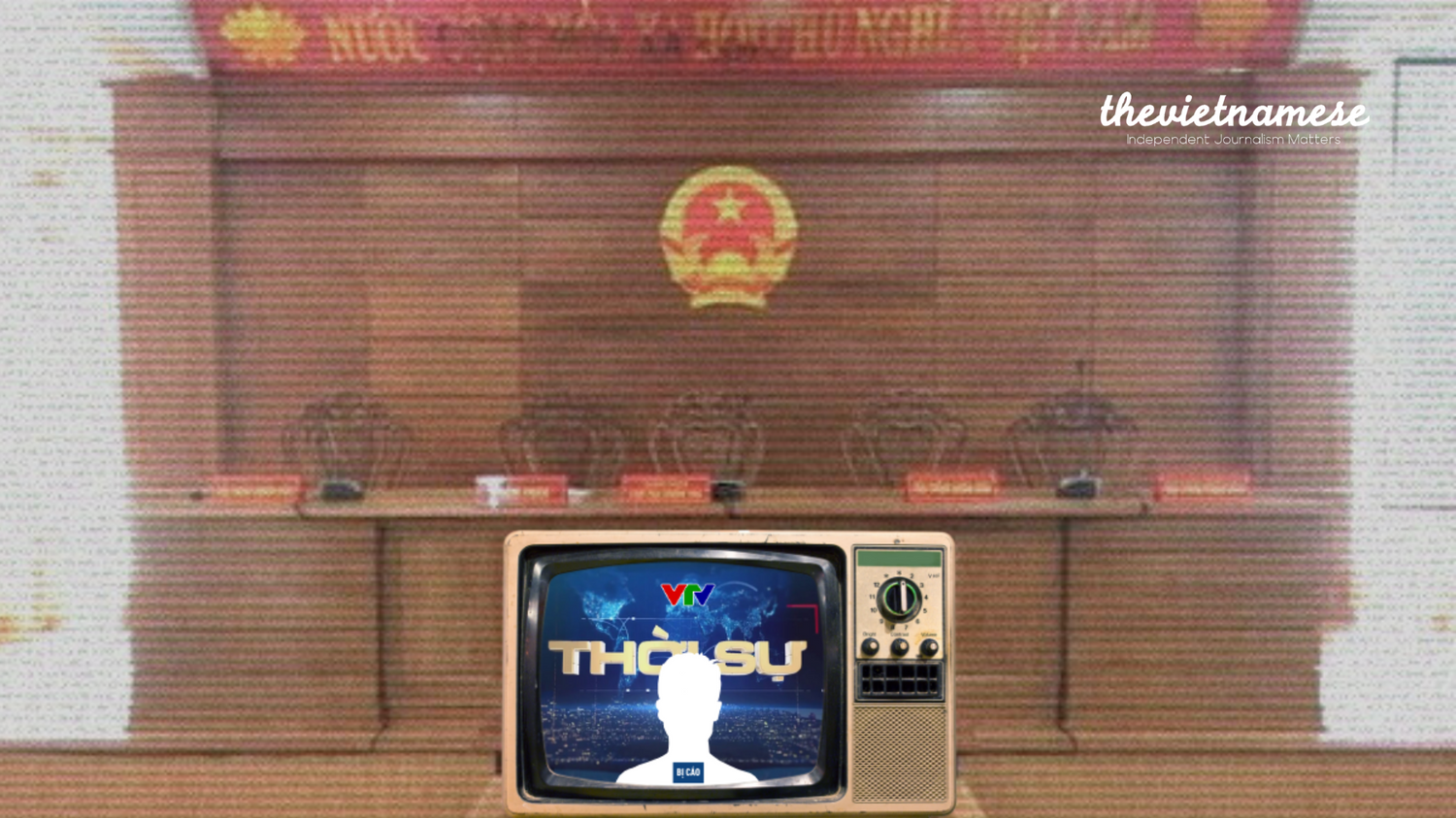
Phong Cầm wrote this article in Vietnamese and published it in Luat Khoa Magazine on March 28, 2025. Đàm Vĩnh Hằng translated it into English for The Vietnamese Magazine.
Vietnamese audiences are no strangers to the sight of defendants and suspects delivering televised confessions on state-run media. While the practice is common, it has rarely been deeply studied.
One notable exception is the work of Dr. Thi Thanh Phuong Nguyen-Pochan, a former journalist with Vietnam Television (VTV) who is now an associate professor of information and communication sciences at the Université Catholique de l’Ouest in France.
In her 2021 article, “Televised Confessions in Việt Nam: Is Television a Courtroom? (Confessions télévisées au Vietnam : la télévision est-elle un tribunal?),” Nguyen-Pochan delves into how these coerced confessions are used as a political tool. She argues they are used to manage dissent, shape narratives about relationships with the West, and suppress land disputes between citizens and the state.
Her analysis focuses on three key cases:
- the 2009 confessions of four pro-democracy activists (Nguyễn Tiến Trung, Trần Anh Kim, Trần Huỳnh Duy Thức, and Lê Công Định),
- the 2017 confession of former Communist Party official Trịnh Xuân Thanh, and
- the 2020 televised statements by villagers detained in the Đồng Tâm land dispute.
Revolutionary Media and Moral Messaging
Since Việt Nam’s reunification in 1975, its media landscape has been firmly under the model of the “revolutionary press” (presse révolutionnaire). The entire system is overseen by three powerful bodies: the Central Propaganda Department, the Ministry of Information and Communications, and the Ministry of Public Security. Alongside the Party’s flagship outlets—such as Nhân Dân newspaper and the Tạp chí Cộng sản journal—Vietnam Television (VTV) stands as one of the regime’s most powerful tools for shaping public opinion.
At the heart of these media operations is a guiding principle known as “revolutionary ethics” (éthique révolutionnaire). This principle serves to uphold the Party’s legitimacy and promote internal unity, primarily through ideological education rooted in the “Hồ Chí Minh Thought”. This moral directive became even more pronounced under the leadership of General Secretary Nguyễn Phú Trọng, who came to power in 2011.
Forced On-Air Confessions
Việt Nam appears to have adopted the practice of coerced televised confessions from China, a tactic also seen in other authoritarian states like Iran. From a media ethics standpoint, this practice is a severe violation of journalistic standards, particularly in broadcast journalism. More importantly, it breaches fundamental human rights by contradicting the basic legal principle of the presumption of innocence—the right of all individuals to be considered innocent until proven guilty in a court of law.
The Case of the Dissidents
The 2009 confessions of the four pro-democracy figures—Nguyễn Tiến Trung, Trần Anh Kim, Trần Huỳnh Duy Thức, and Lê Công Định—were framed by VTV using classic Party-state rhetoric about “hostile forces,” “reactionary elements,” and “undermining national unity.”
Each 20-minute confession followed a rigid, formulaic structure: the subject narrates their supposed moral fall, admits wrongdoing, begs for forgiveness, and pledges not to repeat their actions. To reinforce the message, the broadcasts were immediately followed by commentary from figures representing Party-affiliated organizations, Marxist-Leninist theorists, and members of the Youth Union.
In this setting, television functions not as a source of news but as a moral court, where the Communist Party speaks on behalf of the people to judge and discipline dissenters.
These “confessions” are not acts of free will; they are scripted performances that betray both the individual’s inner convictions and the audience’s trust. The language follows a clear formula of Communist jargon: Deny (criticism of the regime), Denounce (oneself and others), and Defend (the state and its repressive actions).
VTV never discloses the origins of this footage, though it is widely believed to be supplied by the Ministry of Public Security.
The Trịnh Xuân Thanh Affair
In 2017, the case of Trịnh Xuân Thanh, a former Party member accused of corruption, triggered a diplomatic crisis between Việt Nam and Germany after he was reportedly abducted from Berlin and secretly returned to Việt Nam. Shortly after, he appeared on Vietnamese television to “confess.” His statement lasted just 45 seconds, in which he claimed:
“I returned to Vietnam and turned myself in to the Investigative Security Agency to receive leniency from the Party, the State, and the law.”
Unlike the lengthy confessions of the pro-democracy activists, Thanh’s broadcast featured no follow-up commentary from Party loyalists. It served a single, narrow diplomatic function: to refute Germany’s kidnapping accusations and assert that Thanh’s return was willing. The setting was also different; Thanh was filmed in what appeared to be a normal domestic room, a stark contrast to the interrogation rooms used for political dissidents.
According to Dr. Nguyen-Pochan’s analysis, this distinction reflects different political aims:
- The dissidents were portrayed as criminals whose “confessions” were meant to be a lesson for the public.
- Thanh’s confession, on the other hand, was a carefully managed bargaining chip in a geopolitical dispute.
The Đồng Tâm Tragedy
The 2020 Đồng Tâm land conflict marked another dark chapter in the use of televised confessions, where residents detained after a violent police raid were forced to denounce their own neighbors and relatives.
Dr. Nguyen-Pochan writes that “the televised images of Đồng Tâm villagers can only provoke outrage at the injustice and violence of the media treatment.” She notes that the faces of the accused often bore visible signs of physical abuse, yet they were repeatedly portrayed by state media as criminals and agitators.
According to her analysis, the state’s intent was clear: to send a chilling warning to other rural communities and prevent any future resistance.
VTV’s approach was a severe violation of essential journalistic values like truthfulness, transparency, and independence.
The broadcaster failed to cite any sources and implicitly aligned itself with the police and the official state narrative. The presenters’ tone lacked compassion—a key ingredient in ethical journalism—and the broadcasts inflicted emotional harm on both those involved and the broader viewing public.
All the confession videos followed the same visual script: heads bowed, hesitant speech, remorse, and painful pleas for forgiveness.
A Show Trial on National Television
Dr. Nguyen-Pochan concludes that these forced televised confessions are not about justice. They are a political tool used to consolidate state legitimacy and systematically destroy the credibility of any dissenting voice.
In this process, television is no longer a platform for journalism. It becomes a stage for public shaming—a show trial broadcast in prime time, where the verdict is delivered long before the accused ever sees a real courtroom.

